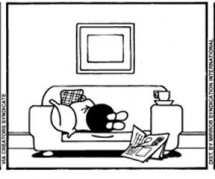Joe by Larry Brown

Ah Andy Capp, you wife-beating drunk!
There is a moment in The Simpsons when Homer chuckles at a cartoon, “Ah Andy Capp, you wife-beating drunk!” Homer might have found Wade Jones, the primary wife-beating drunk in Larry Brown’s “Joe” amusing too, until Wade stabbed him for his blue trousers. Wade drags his starving family – down to five now (we know what happened to baby Calvin, but what happened to the other four children?) – through the snake-ridden backwoods of Mississippi. We’re soon down to four – Gary’s sister takes to her father with a slab of wood and walks out of the family into Larry’s fabulous, “Fay”.
Joe Ransom sleeps in the cab of his car while the team of derelicts he hires daily stalk the vicious undergrowth, killing trees. When not sleeping (say when it is raining too hard to poison anything), or in the lock-up, Joe spends much of his time drive-drinking. That is, he does some hours of his beer and whisky swilling while behind the wheel.
Joe is empathetic and moral (relatively speaking). Against all odds (certainly genetics) Wade’s son Gary has ambition, family feeling and an innate sense of decency. So, this being a Larry Brown novel and therefore a tad on the sentimental side, the two are bound to meet. Joe hires father and son for a day.
“Joe dropped these two off last of all. He pulled up at the entrance to their road and shut off the truck. He took a quick drink of the hot whisky on the seat and shivered, then got out and walked to the back and peered into the camper. The boy was helping his father crawl across the spare tires, the poison gun and jugs, this elder moaning on all fours like a political prisoner newly released from a dungeon. He stood eyeing them and took off his cap. He knew the boy would work – he’d proven that – but the old man would hold him back. He swept one hand through his thick hair and resettled his cap and put his hands on the side of the truck.
‘Can you make it out of there?’ he said. He lit a cigarette.
‘Aw. Yeah. I’ll make it, I guess,’ Wade whispered. ‘Just help me over to the tailgate, son,’ he said in a broken voice. The boy had him by the arm, guiding him along. Joe watched him dispassionately and knew almost certainly that whatever the boy made, the old man would take it from him. Probably every penny. He quickly figured in his head what he owed them, and had the money ready by the time the old man swung his legs over the tailgate. He counted it again and laid it down.
‘What?’ said Wade. He picked up his money. ‘You pay ever day?’
‘Naw,’ said Joe. ‘I don’t need y’all back no more. That’s yours there, son’ he said, nodding at the remaining bills.
‘Well,’ Wade said, that that was all he said. Gary picked up his money and looked at it. Then he looked at Joe.”
Brown describes his poor, sodden characters’ every move with their own sweaty closeness. Like Socrates, he tells us what they do, not what they think as they crawl along relentlessly to nowhere, It’s nowhere, but we know it isn’t going to be good. And like the cottonmouths of Mississippi, Brown’s people move slowly until they strike.
Leave a comment...
While your email address is required to post a comment, it will NOT be published.


3 Comments